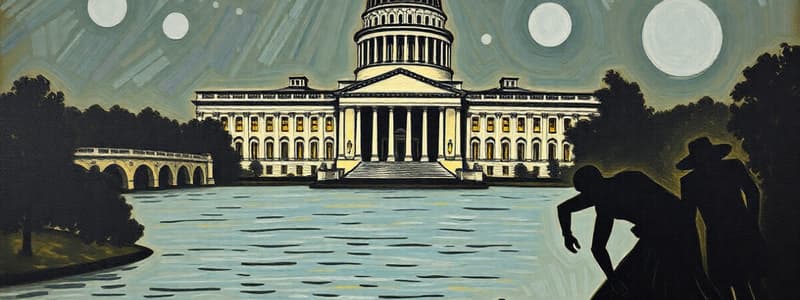Podcast
Questions and Answers
What is the primary function of bureaucracy in the context of government?
What is the primary function of bureaucracy in the context of government?
- To serve as political advisors
- To create new laws
- To provide financial services
- To execute existing laws (correct)
Which department is not considered a cabinet department?
Which department is not considered a cabinet department?
- Department of Defense
- Department of Treasury
- NASA (correct)
- Department of Homeland Security
What system replaced the old spoil system in bureaucratic hiring?
What system replaced the old spoil system in bureaucratic hiring?
- Random selection system
- Direct democratic voting
- Political appointment system
- Merit system (correct)
What role do regulatory agencies play in the bureaucratic system?
What role do regulatory agencies play in the bureaucratic system?
What is a key characteristic of independent agencies like NASA?
What is a key characteristic of independent agencies like NASA?
Which component of bureaucracy was established in response to the events of 9/11?
Which component of bureaucracy was established in response to the events of 9/11?
What is meant by 'rulemaking' in the context of bureaucracy?
What is meant by 'rulemaking' in the context of bureaucracy?
Which of the following describes how bureaucrats are hired in the merit system?
Which of the following describes how bureaucrats are hired in the merit system?
What does the term 'iron triangle' refer to in the context of bureaucracy?
What does the term 'iron triangle' refer to in the context of bureaucracy?
Which oversight method involves monitoring only when issues arise?
Which oversight method involves monitoring only when issues arise?
Which of the following has the most direct control over the actions of bureaucracies?
Which of the following has the most direct control over the actions of bureaucracies?
What is a significant challenge when attempting to reform bureaucracy by treating it like a business?
What is a significant challenge when attempting to reform bureaucracy by treating it like a business?
Which of the following accurately describes the role of Congress regarding bureaucracies?
Which of the following accurately describes the role of Congress regarding bureaucracies?
In what way does 'overhead democracy' empower citizens regarding bureaucratic control?
In what way does 'overhead democracy' empower citizens regarding bureaucratic control?
What are the potential consequences of an iron triangle forming among interest groups, Congress, and bureaucracies?
What are the potential consequences of an iron triangle forming among interest groups, Congress, and bureaucracies?
Which concern does bureaucratic lobbying primarily address?
Which concern does bureaucratic lobbying primarily address?
Flashcards are hidden until you start studying
Study Notes
Bureaucracy
- A system of public agencies which translate the will of the people into action.
- They execute laws created by legislators
Executive Department
- Made up of top government officials.
- Includes cabinet departments which have a high level of stability; they cannot be replaced easily.
- Some examples of cabinet departments:
- State Department
- Department of Defense (formerly Department of War)
- Department of Treasury
- Department of Homeland Security (Created after 9/11)
Independent Agencies
- Operate separately from cabinet departments.
- Examples:
- NASA - Exists independently to reduce political influence and emphasize its scientific goals.
Regulatory Agencies and Commissions
- Operate separately from cabinet departments.
- Examples:
- U.S. Securities and Exchange Commission
- Maintain independence to ensure regulations are consistent across presidential administrations.
Government Corporations
- Run by the government, but not necessarily for profit.
- Provide specific services.
- Example: The U.S. Postal Service
The Merit System
- How bureaucrats are hired.
- Replaced the "Spoil System"
- Focuses on neutral competence.
- Emphasize the importance of qualified individuals for government roles.
- Was formally introduced in 1883 with the Pendleton Act.
Powers of Bureaucracy
- Rulemaking:
- Interpreting and clarifying laws passed by Congress.
- Example: Defining "readily accessible and usable for people with disabilities" for accessibility regulations.
- Adjudication:
- Judging whether a rule has been violated.
Bureaucratic Lobbying
- The concern that bureaucrats can create an "Iron Triangle."
- Iron Triangle - A system of relationships between bureaucracy, Congress, and interest groups.
- Example: Veterans Affairs working with Congress and veterans' interest groups to advance veterans' interests.
- Concern: Could result in excessive resources and regulations.
- More likely to form when there is strong unity between the three groups.
Monitoring Bureaucracy
- Overhead Democracy: Citizens have indirect control over bureaucracy through elections.
- Police Patrol Oversight: Regular investigation and monitoring of bureaucracies (time-consuming)
- Fire Alarm Oversight: Only monitoring when something goes wrong.
- Concern: Reactive, not preventative.
Influencing Bureaucracy
The President
- Highest level of control over bureaucracy.
- Appointment power: Can appoint top officials within agencies.
- Executive Orders: Can direct agencies on specific actions.
- Delaying money from Congress (Impoundment): Can withhold funds from agencies.
Congress
- Can create and destroy agencies (President only has influence over hiring).
- Sets the budget for agencies (can fund more or less).
- Power of the purse: Controls the flow of money to agencies.
- Legislative veto: Can overturn agency actions.
The Judiciary
- Has the power to review agencies' actions for compliance with legislative intent.
- Ensures agencies follow due process standards.
Reforming Bureaucracy
- Government is not a business.
- Government officials are subject to different rules than the private sector.
- Government prioritizes fulfilling the will of the people, not necessarily making a profit.
- Businesses strive for profit and growth but government provides services like law enforcement, military action, etc. that are not always profitable.
Studying That Suits You
Use AI to generate personalized quizzes and flashcards to suit your learning preferences.




